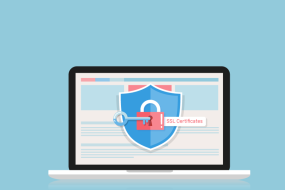
In today’s digital age, where information flows freely across the internet, securing your online presence has become paramount. SSL certificates, or Secure Sockets Layer certificates, play a vital role in safeguarding your digital fortress. This comprehensive guide will explore SSL certificate best practices, ensuring your website and data are protected against potential threats.
Understanding SSL Certificates
Before delving into best practices, it’s essential to understand what SSL certificates are and how they work. SSL certificates are small data files that encrypt the communication between your website and a user’s web browser, ensuring that sensitive data, like login credentials and payment information, remains confidential. These certificates are indicated by the padlock icon and “https” in the browser’s address bar.
How SSL Encryption Works
SSL encryption uses a pair of keys, a public key to encrypt the data and a private key to decrypt it. This encryption ensures that only the intended recipient can decipher the information, making it challenging for cybercriminals to intercept and misuse data.
The Importance of SSL Certificates
Now, let’s explore why SSL certificates are crucial for your website and online presence.
Data Security
SSL certificates protect the data exchanged between your website and users. This encryption is vital for e-commerce websites, where sensitive customer information, such as credit card details, is transmitted.
Trust and Credibility
Websites with SSL certificates are trusted more by users. When visitors see the padlock icon and “https” in the address bar, they know their information is secure, enhancing your website’s credibility.
SEO Benefits
Search engines, like Google, favor websites with SSL certificates. Having one can positively impact your website’s search engine rankings, potentially increasing your online visibility.
SSL Certificate Best Practices
Now, let’s delve into the best practices for implementing and managing SSL certificates on your website.
Choose the Right Certificate Type
There are various SSL certificate types, including Domain Validation (DV), Organization Validation (OV), and Extended Validation (EV) certificates. The choice depends on your website’s needs and the level of trust you want to establish with your users.
Keep Certificates Updated
SSL certificates have a validity period, typically ranging from one to two years. It’s essential to keep your certificates up to date to avoid potential security breaches.
Use 2048-bit Key Certificates
To ensure strong encryption, it’s recommended to use 2048-bit key certificates. This offers a higher level of security against emerging threats.
Implement HTTPS Across Your Website
Securing only certain pages of your website is not enough. Implement HTTPS across your entire site to ensure consistent protection for all your visitors.
Monitor Certificate Expiry
Regularly monitor the expiration dates of your SSL certificates. An expired certificate can lead to a loss of user trust and potential security issues.
Enable HTTP/2
HTTP/2 is a more secure and efficient protocol than its predecessor. Enabling it can improve website performance and security.
Use a Content Delivery Network (CDN)
A CDN can help distribute the load and improve the speed and security of your website. Ensure your SSL certificates work seamlessly with your chosen CDN.
Final Words
In an era where cyber threats are prevalent, SSL certificates are your first line of defense in securing your digital fortress. By implementing the best practices outlined in this guide, you can protect your website, gain the trust of your users, and enhance your online presence.
Commonly Asked Questions
1. What is the difference between HTTP and HTTPS?
HTTP is an unsecured protocol for data transfer, while HTTPS uses SSL certificates to encrypt and secure data, making it safer for users.
2. Are there free SSL certificate options?
Yes, some Certificate Authorities offer free SSL certificates, like Let’s Encrypt. However, these certificates may have limitations and are recommended for smaller websites.
3. How do I install an SSL certificate on my website?
The installation process can vary depending on your web hosting provider. Usually, it involves generating a CSR (Certificate Signing Request), getting the certificate, and installing it on your server.
4. Can I use one SSL certificate for multiple subdomains?
Yes, you can use a Wildcard SSL certificate to secure multiple subdomains under the same domain.
5. Is it essential for all websites to have SSL certificates?
While it’s not mandatory for all websites, having an SSL certificate is highly recommended to ensure the security and trustworthiness of your online presence.
Advertisement








